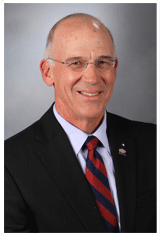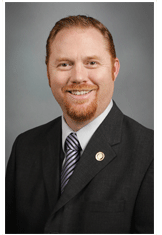JEFFERSON CITY, Mo. – The Senate Interim Committee on Utility Regulation and Infrastructure Investment met Tuesday and Wednesday, hearing from consumer groups, utilities, and utility regulators. The committee, chaired by Sen. Ed Emery, R-Lamar, convened hoping to learn before tackling infrastructure investment again in the upcoming legislative session.
Emery hopes to see more progress in the General Assembly on improving the regulatory environment and utility modernization.

“We were presented with a wealth of information for the committee to consider,” Emery said. “Hopefully this hearing puts us on a road to pass meaningful infrastructure investment legislation this next session.”
Emery noted that he was not happy with last session’s grid modernization bill stalling, but he hopes bringing more stakeholders into the conversation will allow more lawmakers see investment as a “definite need.”
THE PROBLEM
The committee was presented by a variety of groups, ranging from the Center for Business and Regulation to Black and Veatch, an engineering company, and Missouri American Water. The presenters were all in agreement that the business environment for utilities is volatile, which is impacting utilities’ ability to modernize their infrastructure. Presenters offered varying opinions of what balance is right for Missouri, but showed a grim picture of challenges to utilities.
Black and Veatch’s presentation centered around a need to address the challenges by finding a “fundamental rebalancing of the regulatory compact.”
“The bottom line is the gas utility industry requires ratemaking and regulatory solutions that address both revenue stability and revenue sufficiency.”
Meanwhile, the electric industry reflected a similar outlook.
“Traditional approaches to utility regulation can fail to provide timely rate relief for such conditions,” said a presentation from the Edison Electric Institute (EEI). “The frequency of rate cases has increased. Utilities facing a pronounced gap between cost and billing determinant growth can experience chronic under-earning even with annual rate cases. Financial attrition undoubtedly has been a factor in the long-term decline of average credit ratings among investor-owned electric utilities… Judicious use of targeted approaches can bring revenue and cost growth into better balance and reduce the frequency of rate cases.”
EEI Executive Vice President of Business Operations and Regulatory Affairs David Owens expressed concern at the environment, hoping to see some change.
“It is an understatement to say that utilities are in a rapidly changing environment,” said Owens. “They are in a period of transformation.”
Meanwhile, Office of Public Counsel (OPC) Acting Director James Owen was critical of what infrastructure problem could not be solved within the status quo.
“One of the paramount questions we ask whenever anyone wants to discuss reforming the process is what problems must be fixed and, if there is a problem identified, can it be done under the current system,” Owen said. “This committee wants to address grid modernization. Yet not one person from the utilities have pointed to a project they cannot do under the current regulatory scheme. Several people calling for reform say there’s too much time between when costs are incurred and when rates may be increased. But no one looks at the benefits of this time period for not only consumers but also for the utility companies.”
FINDING A SOLUTION
Ameren Missouri entered Senior Director of Regulatory Affairs Thomas Byrne’s testimony from the Public Service Commission (PSC), stressing the need of addressing “regulator lag.”
“The bottom line is that, contrary to the implications in some of the initial comments…organizations recognize the problems that regulator lag is causing Missouri’s electric utilities and the opportunities that Missouri has to address these issues,” wrote Bryne. “Ameren Missouri is hopeful that the upcoming workshops will offer a real opportunity to address these issues to the ultimate long-term benefit of customers and utilities alike.”
Utility groups were followed up by utility regulators from Missouri and other states, comparing their own policies and voicing their opinion on what is currently working and not working.
“As a long-time consumer advocate, it is not often that I support ratemaking adjustments or bill surcharges,” said Richard E. Sobolewski Supervisor of Utility Financial Analysis State of Connecticut Office of Consumer Counsel. “However, the collaborative process in Connecticut and generic proceedings before PURA ensured that both the WICA and RAM legislation were structured properly upfront. Now as the WICA process has continued to develop and water revenues are trued-up to their allowed levels, Connecticut has enjoyed a period of a dramatic increase in infrastructure replacement, limited rate case activity and improved financial viability of our water companies. It truly has been a win-win situation for all sides.”
Familiar face to utilities, Erin M. O’Connell-Diaz, a commissioner emeritus at the Illinois Commerce Commission and President of FutureFWD, presented to the committee, making her case for performance based rates (PBR) which is used in Illinois.
“Given our experience with performance based rates you and your colleagues can be assured it is not an untried idea but a regulatory model that is transformative and works in both traditional and deregulated states,” said Diaz. “This legislation is currently allowing Illinois utility customers to be participants int he 21st century by leveraging a modernized utility foundation with new technologies, services and customer benefits that are the value streams of tomorrow.”
Meanwhile, Missouri’s-own PSC chimed in their own solution.
“The best approach to change would be to provide the Commission with flexibility to address the changing needs of the regulatory environment while continuing to maintain its core responsibility of ensuring customers receive safe and adequate service at just and reasonable rates,” said Natalie Dietrich, Public Service Commission Staff Director.
PSC Staff’s position was backed up in earlier testimony from UIS Center for Business and Regulation.
“Enabling legislation should provide authority to state commission to adopt/employ alternative forms of regulation on a case-by-case basis,” their presentation stated. “Legislation should empower the commission by ensuring it has ample regulatory tools to address problems as they unfold. If the Legislature identifies a problem as critical to the public interest it can pass legislation that targets a particular mechanism to address the particular problem.”
Throughout presentations, surcharges took center stage, as witnesses discussed the Infrastructure System Replacement Surcharge (ISRS), and Distribution System Improvement Charge (DSIC) and more as potential solutions to re-assess for the various utilities. ISRS is currently utilized by many utilities to fund repairs, maintenance and replacement to infrastructure.
However, some committee members were more critical of what progress was made in the two-day hearing.

“The committee heard from both utilities and consumers about the prospects of modernizing the grid,” said Sen. Jason Holsman, D-Kansas City. “No new ground was plowed. The utilities favor a regulatory process that reduces lag and quickens investment in the grid. The consumers believe the status quo works well as a check on unnecessary spending raising rates. Nothing in the hearing leads me to believe we are any closer to a compromise.”
OPC also proposed their own solution, hoping that the PSC improvements would improve the overall climate.
“Noting things can always be improved, the OPC has proposed a series of discovery and procedural changes that can be imposed by the Public Service Commission without legislative intervention that would shave months off this process while still maintaining the integrity of the system and protect ratepayers,” said Owen. “We are hopeful lawmakers and policymakers take a serious look at these proposals and consider putting those in place rather than far-reaching changes for a problem not wholly defined.”
Missouri Energy Development Association (MEDA) overall appreciated the hearing and what solutions may come from the abundance of information provided.
“MEDA and it’s members appreciate President Pro Tem Richard and Chairman Emery convening this important interim committee to address Missouri’s regulatory framework and how we invest in critical utility infrastructure,” said Trey Davis, executive director of MEDA. “The nationally recognized speakers shared with the committee how customer demands and grid modernization is rapidly evolving all across the country. MEDA looks forward to continuing to work with the committee to find a mutually beneficial solution that will enhance Missouri’s regulatory model to accelerate investment in aging infrastructure while continuing to deliver safe, reliable, and affordable energy and water resources to consumers.”
Rachael Herndon was the editor at The Missouri Times and also produced This Week in Missouri Politics, published Missouri Times Magazine, and co-hosted the #MoLeg podcast. She joined The Missouri Times in 2014, returning to political reporting after working as a campaign and legislative staffer.
Rachael studied at the University of Missouri – Columbia. She lives in Jefferson City with her husband, Brandon, and their two children.







